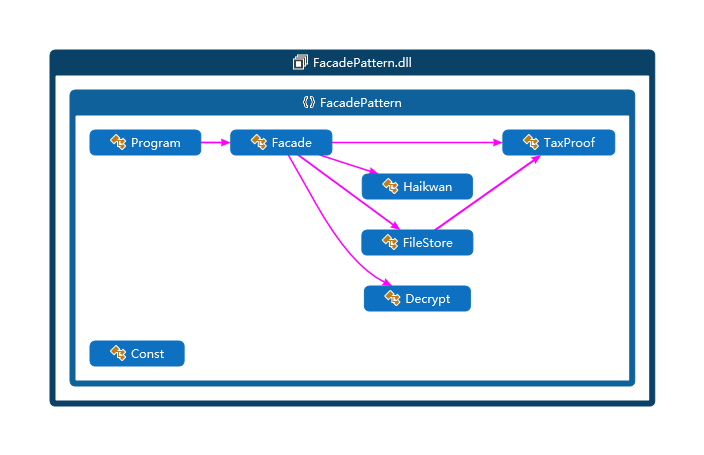11、C#设计模式 - 外观模式
外观模式(Facade Pattern)
外观模式属于结构型模式,它隐藏了系统的复杂性,并向客户端提供了一个客户端可以访问系统的接口。
为子系统中的一组接口提供了一个统一的访问接口,这个接口使得子系统更容易被访问或者使用。
角色:
1、 外观角色(Facade);
外观模式的核心,它被客户角色调用,它熟悉子系统的各项功能,可以在内部根据需求预定几种功能的组合;
2、 子系统角色(SubSystem);
实现了子系统的功能,它内部可以有系统内的相互交互,也可以由供外界调用的接口。
示例:

命名空间FacadePattern中包含外观类Facade,提供公开的Handle方法,Haikwan是海关类,可以通过Apply方法从后台取得一个加密的完税凭证JSON数据,Decrypt类为解密类,可以解密海关的JSON数据,TaxProof则是完税凭证类,可以将JSON反序列化成一个对象,FileStore则将完税凭证数据持久化到文件中。本案例尝试通过一个从海关获取数据、解密、反序列化、保存到文件的完整流程来向大家简明扼要的阐述外观模式的使用。
namespace FacadePattern
public class Haikwan {
public string Apply(Uri uri) {
Console.WriteLine($"Apply some data from {uri.ToString()}!");
return Const.TEMPLET_HAIKWAN;
}
}
海关类Haikwan,包含一个Apply方法可以从海关的后台获取一个加密的JSON数据。
public class Decrypt {
public string Decipher(string ciphertext) {
Console.WriteLine("Deciphering ciphertext!");
Console.WriteLine(Const.LINE_BREAK);
Console.WriteLine(ciphertext);
Console.WriteLine(Const.LINE_BREAK);
return ciphertext;
}
}
解密类Decrypt,将加密的JSON数据用Decipher方法解密成原始JSON数据。
public class TaxProof {
public string TaxNo { get; private set; }
public decimal Money { get; private set; }
public DateTime PaymentData { get; private set; }
public void Deserialize(string plaintext) {
Console.WriteLine("Creating TaxProof Instance from plaintext!");
TaxNo = "287361039374492-A01";
Money = 1986.1020m;
PaymentData = new DateTime(2018, 07, 20);
}
}
TaxProof完税凭证类,将JSON数据反序列化成实体对象,以便使用类的面向对象语言的优势进行后续的处理。
本例中没有真正实现反序列化的动作,仅仅作为一个演示使用了Hard Code。在实际开发过程中,推荐使用Newtonsoft.Json来处理序列化和反序列化。
public class FileStore {
public void Store(TaxProof taxProof) {
Console.WriteLine("Saving taxProof instance to file!");
Console.WriteLine($"TaxProof.TaxNo = {taxProof.TaxNo},");
Console.WriteLine($"TaxProof.Money = {taxProof.Money},");
Console.WriteLine($"TaxProof.PaymentData = {taxProof.PaymentData}!");
Console.WriteLine(Const.LINE_BREAK);
}
}
FileStore文件保存类,将完税凭证数据持久化到文件中。
public class Facade {
private Haikwan _haikwan = null;
private Decrypt _decrypt = null;
private TaxProof _taxProof = null;
private FileStore _fileStore = null;
public Facade() {
_haikwan = new Haikwan();
_decrypt = new Decrypt();
_taxProof = new TaxProof();
_fileStore = new FileStore();
}
public void Handle(Uri uri) {
var ciphertext = _haikwan.Apply(uri);
var plaintext = _decrypt.Decipher(ciphertext);
_taxProof.Deserialize(plaintext);
_fileStore.Store(_taxProof);
}
}
Facade外观类,这是外观模式的核心类,首先在内部维持对海关类Haikwan、解密类Decrypt、完税凭证类TaxProof、文件保存类FileStore的引用,并在构造函数中创建它们,公开的Handle方法处理一个完整的从海关获取数据到持久化文件的完整流程。
public class Const {
public const string TEMPLET_HAIKWAN = "{\r\n" +
" \"Haikwan\": {\r\n" +
" \"TaxNo\": \"287361039374492-A01\",\r\n" +
" \"Money\": 1986.1020,\r\n" +
" \"PaymentData\": \"\\/Date(1532099596)\\/\"\r\n" +
" }\r\n" +
"}";
public const string LINE_BREAK =
"-------------------------------------------------------------";
public const string HAIKWAN_URI =
"http://@copyright#www.customs.gov.cn";
}
Const常量类,统一管理本案例中用到的字符串资源。实际开发过程中不应当出现此类,请参考2017年阿里发布的《阿里巴巴Java开发手册》,此规则对C#开发者来说也应当遵守。
public class Program {
private static Facade _facade = null;
public static void Main(string[] args) {
_facade = new Facade();
_facade.Handle(new Uri(Const.HAIKWAN_URI));
Console.ReadKey();
}
}
调用方的代码,仅仅需要一行代码就完成了一个完整的流程。以下是这个案例的输出结果:
Apply some data from http://@copyright/#www.customs.gov.cn!
Deciphering ciphertext!
-------------------------------------------------------------
{
"Haikwan": {
"TaxNo": "287361039374492-A01",
"Money": 1986.1020,
"PaymentData": "\/Date(1532099596)\/"
}
}
-------------------------------------------------------------
Creating TaxProof Instance from plaintext!
Saving taxProof instance to file!
TaxProof.TaxNo = 287361039374492-A01,
TaxProof.Money = 1986.1020,
TaxProof.PaymentData = 2018-07-20 00:00:00!
-------------------------------------------------------------
优点:
1、 实现了子系统与客户端之间的松耦合关系;
2、 客户端屏蔽了子系统组件,减少了客户端所需处理的对象数目,并使得子系统使用起来更加容易;
缺点:
1、 不符合开闭原则,如果要修改某一个子系统的功能,通常外观类也要一起修改;
2、 没有办法直接阻止外部不通过外观类访问子系统的功能,因为子系统类中的功能必须是公开的(根据需要决定是否使用internal访问级别可解决这个缺点,但外观类需要和子系统类在同一个程序集内);
使用场景:
1、 设计初期阶段,应该有意识的将不同层分离,层与层之间建立外观模式;
2、 开发阶段,子系统越来越复杂,增加外观模式提供一个简单的调用接口;
3、 维护一个大型遗留系统的时候,可能这个系统已经非常难以维护和扩展,但又包含非常重要的功能,为其开发一个外观类,以便新系统与其交互;